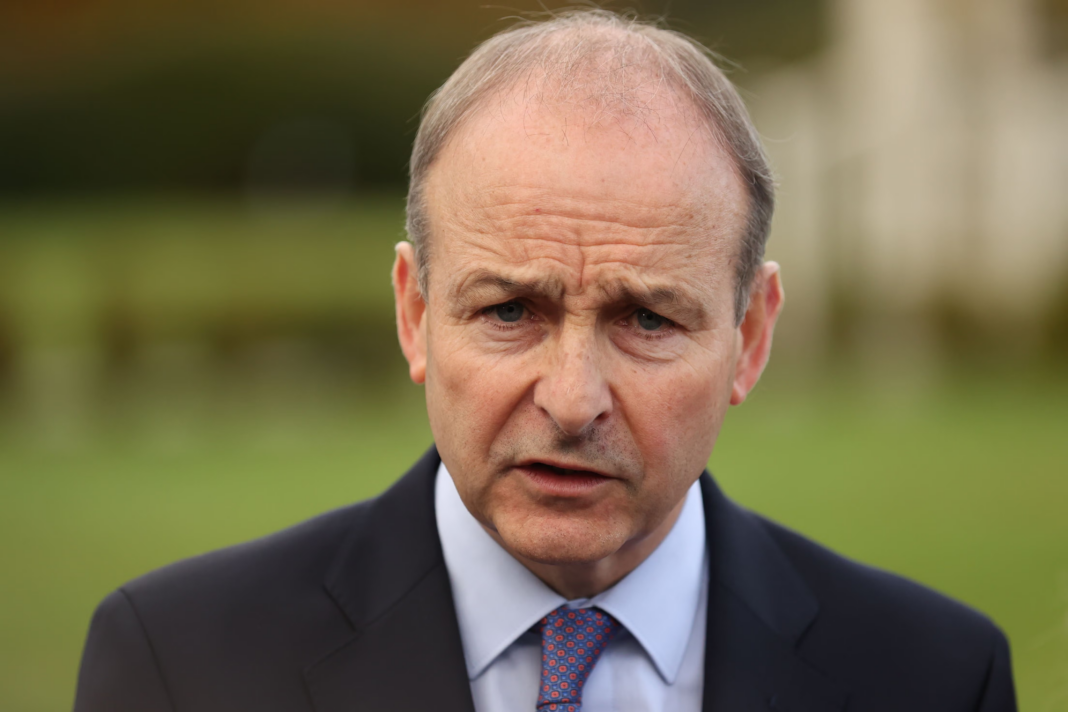A bizarre exchange occurred during a recent Oval Office meeting between U.S. President Donald Trump and Irish Prime Minister Micheál Martin, leaving the Irish leader visibly perplexed. The question, posed by Brian Glenn, chief White House correspondent for the Trump-supporting outlet Real America’s Voice, focused on Rosie O’Donnell’s recent move to Ireland. What followed was an awkward moment that captured the attention of both the press and social media.
A Question That Took Prime Minister Martin by Surprise
The inquiry that left Prime Minister Martin stumped came from Brian Glenn, who asked, “Why in the world would you let Rosie O’Donnell move to Ireland? I think she is going to lower your happiness level.” The unusual nature of the question clearly caught Martin off guard, who chuckled but appeared unsure of how to respond. The Prime Minister seemed unaware of the context or significance of the question, which likely stemmed from O’Donnell’s outspoken opposition to President Trump in the past.
As Martin hesitated, President Trump intervened, asking, “Do you know who she is?” to which the Prime Minister nodded in the negative, further emphasizing his confusion about the issue at hand. Glenn, attempting to lighten the situation, said, “I’m joking,” before Trump added, “You are better off not knowing.” The awkward exchange was a stark contrast to the more diplomatic nature of the rest of the meeting, highlighting the peculiarities of Trump’s interactions with both the media and foreign leaders.
The question about O’Donnell’s move to Ireland was one of many offbeat moments during the meeting, where President Trump and his supporters seemed more focused on entertainment value than discussing serious global issues. Despite the seemingly trivial nature of the question, it set social media ablaze, with many questioning the role of such inquiries in the White House press pool.
Rosie O’Donnell’s Move to Ireland: A Political Statement
Rosie O’Donnell, a longtime critic of President Trump, recently announced that she had moved to Ireland and was in the process of obtaining Irish citizenship. In a TikTok video, O’Donnell explained her decision, stating, “When it is safe for all citizens to have equal rights there in America, that is when we will consider coming back.” Her move to Ireland was seen by many as a symbolic gesture in protest of Trump’s policies, particularly on issues related to civil rights.
O’Donnell has long been an outspoken adversary of Trump, having participated in rallies and demonstrations against his presidency. Her move to Ireland is just the latest chapter in her ongoing feud with the former president, which has included sharp public criticisms and calls for action against his administration’s controversial policies. While her decision to seek Irish citizenship may have been a personal one, it also serves as a powerful political statement, signaling her dissatisfaction with the direction of U.S. politics under Trump’s leadership.
The Irish Prime Minister’s apparent confusion regarding O’Donnell’s move underscores the broader disconnect between domestic political issues in the U.S. and how they are perceived internationally. While O’Donnell’s relocation to Ireland may be seen as a protest by Americans, it may hold little significance for leaders abroad who are focused on managing their own national priorities.
White House Press Pool and the Rise of Right-Wing Media
The strange moment in the Oval Office also highlighted the changing dynamics of the White House press pool under the Trump administration. For decades, the White House Correspondents’ Association (WHCA) has managed the press pool, a group of journalists who cover the most exclusive events and press conferences. However, the Trump White House has taken a more hands-on approach to controlling which reporters gain access to these events, favoring right-wing media outlets over traditional, mainstream journalism.
This shift has been met with criticism from established news organizations, which argue that the move undermines the integrity and transparency of the press. By granting more access to conservative outlets like Real America’s Voice, the White House has been accused of curating the narrative that is presented to the American public. Critics argue that such media outlets, while providing coverage that aligns with the administration’s agenda, do not always adhere to the journalistic standards expected of outlets with access to the White House.
As the press pool continues to evolve under the current administration, questions about the independence and objectivity of the media’s role in covering the White House remain a significant point of contention. The O’Donnell question may have been trivial, but it reflects a broader trend in which media access and control are increasingly becoming political tools in the hands of those in power.
The Cultural and Political Significance of the Exchange
The odd exchange between Brian Glenn and Prime Minister Martin is more than just an awkward moment; it underscores the intersection of celebrity culture, politics, and media access in the Trump era. Rosie O’Donnell’s decision to move to Ireland is far from a simple relocation; it is a statement against the political climate in the U.S. that has left many Americans, particularly celebrities, feeling disillusioned with their country’s leadership.
For Prime Minister Martin, the question about O’Donnell likely seemed out of place in a diplomatic meeting. However, it serves as a reminder of how deeply American politics and culture have permeated global discussions, sometimes to the detriment of serious international relations. Martin’s reaction—part confusion, part amusement—reflects the growing absurdity of many political exchanges in today’s polarized climate.
While the question about O’Donnell’s move may have been more about scoring political points than fostering diplomatic dialogue, it highlights the broader tensions between the U.S. and other countries, particularly in terms of how American political figures and celebrities are viewed abroad. The way the White House is handling media access and the kinds of questions being asked could have lasting implications for how future generations of politicians, journalists, and citizens engage with the political system.
